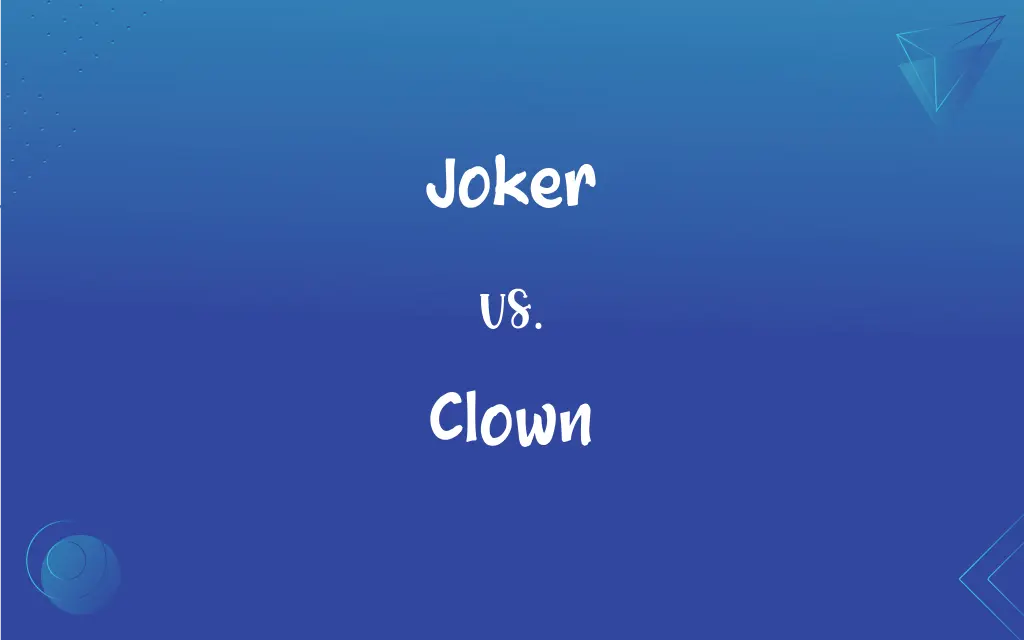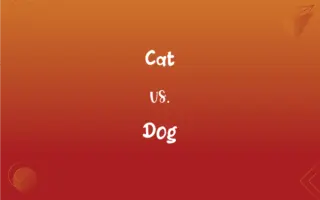Joker vs. Clown: What's the Difference?
Edited by Aimie Carlson || By Harlon Moss || Updated on October 13, 2023
A joker is a person who enjoys making jokes or a wildcard in a deck of cards, while a clown is a performer with makeup and costume, often performing in circuses.

Key Differences
A joker tends to convey a broader scope than a clown, encapsulating both the playful and comedic individuals and a specific playing card in a deck. Contrarily, a clown typically signifies a performer, often garbed in distinctive makeup and costumes, intended to amuse and entertain through physical comedy and other playful acts. Jokers might be depicted or interpreted in diverse contexts, from the prankster at a gathering to a symbolic or literal element within various media or games. Meanwhile, clowns predominantly maintain their association with entertainment, particularly within specific venues like circuses or children's parties.
The term "joker" isn’t rigidly tethered to a specific visual representation or vocational connotation, but the word "clown" immediately conjures images of colorful outfits, exaggerated makeup, and a particular type of performance art. A joker might be recognized across varied mediums and settings, perhaps as a character trait in a person or a strategic card in a game. In contrast, clowns are almost invariably linked to their visually striking aesthetic and their role in providing entertainment, often through physical comedy, tricks, and interactive performances.
The context of a joker could range from light-hearted to dark, particularly evident in various cultural and media portrayals. Clowns, despite some variations and explorations into darker thematic content, primarily symbolize fun, light-heartedness, and entertaining antics. Jokers can traverse a spectrum from the fun-loving friend, the trickster in tales, to darker, more complex figures in narratives like films and books. Clowns, even when depicted in a more sinister light, maintain their foundational roots in entertainment and performance, albeit possibly twisted into a darker narrative.
Despite both jokers and clowns often being associated with humor and play, a joker might navigate more towards wit, tricks, or verbal comedy, while clowns are conventionally tethered to visual and physical comedy. Jokers could wield their humor and playfulness in subtle, perhaps cunning ways, seamlessly embedded within interactions and dialogues. Clowns lean into a more overt exhibition of their comedic intent, utilizing physicality, props, and visual gags to entertain and amuse audiences.
Jokers might symbolize unpredictability, change, or variable elements, seen vividly in their portrayal as a wildcard in card games. On the contrary, clowns represent a consistent symbol of comedic performance, even when adapted into various thematic contexts. A joker in a card game, for instance, might alter the dynamic or introduce an unpredictable factor, symbolic of its variable nature. Clowns, regardless of the narrative or thematic context, remain synonymous with their role in entertainment and performance, even if the intent or impact of their antics shifts.
ADVERTISEMENT
Comparison Chart
General Definition
Can be a playful person or a wildcard card.
A performer who entertains with physical comedy and costumes.
Visual Representation
Not specifically tied to a particular look.
Distinctive for its colorful, exaggerated makeup and costumes.
Thematic Spectrum
Can range from light-hearted to dark.
Primarily associated with fun and entertainment, with some dark thematic exceptions.
Type of Comedy
May engage in wit, verbal jokes, or tricks.
Known for physical comedy, visual gags, and playful antics.
Symbolism
Represents change, variability, or unpredictability.
Consistently symbolizes comedic performance and entertainment.
ADVERTISEMENT
Joker and Clown Definitions
Joker
Joker can refer to a wildcard in a deck of cards.
He pulled a joker from the deck, altering the game’s direction.
Clown
Clowns often wear exaggerated makeup and colorful costumes.
The clown's bright red nose and vibrant outfit brought smiles to the children's faces.
Joker
A joker often denotes a person who enjoys making jokes.
The class joker always knew how to make everyone laugh.
Clown
A clown may engage in physical comedy to evoke laughter.
The clown slipped on a banana peel, eliciting giggles from the audience.
Joker
Joker can represent an unpredictable element in various contexts.
In the film, the joker introduced unexpected twists to the plot.
Clown
The clown may sometimes be depicted in a sinister or dark manner in media.
In the horror movie, the clown was a symbol of fear and unpredictability.
Joker
A joker might signify a character who is playful and tricky.
The joker in the story always had a clever trick up his sleeve.
Clown
A clown is a performer who entertains with humorous acts.
The clown at the party twisted balloons into amusing shapes.
Joker
A joker may also symbolize a facet of personality, embracing play and cunning.
Her inner joker surfaced during playful, strategy-driven board games.
Clown
Clowns are commonly associated with circuses and children’s events.
At the circus, the clown juggled and rode a tiny bicycle to entertain the crowd.
Joker
One who tells or plays jokes.
Clown
A buffoon or jester who entertains by jokes, antics, and tricks in a circus, play, or other presentation.
Joker
An insolent person who seeks to make a show of cleverness.
Clown
One who jokes and plays tricks.
FAQs
Can a joker be a professional role like a clown?
Generally, no – a joker is often not recognized as a professional role in the way a clown is.
Where do clowns typically perform?
Clowns often perform in circuses, parties, and various entertainment events.
How are clowns usually perceived by children?
Clowns are generally seen as fun and entertaining, but some children may find them frightening.
What is the Joker's role in a standard deck of cards?
The Joker often serves as a wildcard, but its role can vary depending on the game being played.
Are clowns always associated with positive emotions?
Mostly, yes, but clowns can sometimes be depicted as creepy or scary, especially in certain media contexts.
Is clowning considered a respected art form?
Yes, clowning is often recognized as a valid and skilled performance art.
Are jokers typically included in standard card decks?
Yes, most standard decks include two joker cards, although they are not used in all games.
Are there different types of jokers in popular culture?
Yes, portrayals of jokers can range from playful tricksters to menacing villains, depending on the context.
Can the term joker refer to a specific individual in popular culture?
Yes, the Joker is a well-known antagonist in the Batman comic and film series.
Is the role of a clown culturally universal?
While the concept of a comedic performer is widespread, the specific role and portrayal of clowns can vary by culture.
Do jokers exist in all card games?
No, the use of jokers is dependent on the specific rules of each card game.
What type of training do clowns typically undergo?
Clowns often receive training in various performing arts, including physical comedy, juggling, and sometimes even acrobatics.
What is a joker?
A joker can be a person who makes jokes or a wildcard in a deck of cards.
How is a clown typically portrayed?
Clowns are usually performers with exaggerated makeup and costumes, specializing in physical comedy.
What is the main function of a joker in a deck of cards?
A joker usually acts as a wildcard, which can substitute for any other card.
Can a clown perform outside of comedic contexts?
While primarily associated with comedy, clowns can appear in various performance contexts, including drama or horror.
Are there different types or categories of clowns?
Yes, clowns can be categorized based on their acts, appearance, and roles, such as Auguste clowns, whiteface clowns, or character clowns.
Are jokers always depicted as fun and harmless?
No, jokers can be portrayed across a range, from fun-loving to malevolent, especially in literature and film.
Can anyone become a clown?
While many can pursue clowning, professional clowns typically undergo specific training in the performing arts.
Can the concept of a joker exist outside of card games and playful individuals?
Yes, the concept of a joker can be utilized metaphorically or symbolically in various aspects of culture and literature.
About Author
Written by
Harlon MossHarlon is a seasoned quality moderator and accomplished content writer for Difference Wiki. An alumnus of the prestigious University of California, he earned his degree in Computer Science. Leveraging his academic background, Harlon brings a meticulous and informed perspective to his work, ensuring content accuracy and excellence.
Edited by
Aimie CarlsonAimie Carlson, holding a master's degree in English literature, is a fervent English language enthusiast. She lends her writing talents to Difference Wiki, a prominent website that specializes in comparisons, offering readers insightful analyses that both captivate and inform.































































